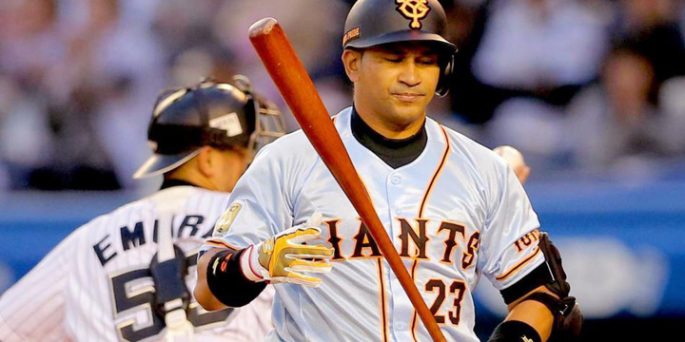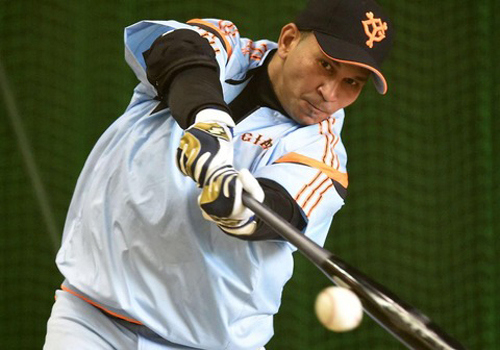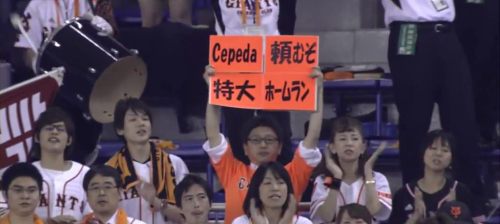
Cepeda, the return of an idol
Last Sunday night saw the return to Cuba of star player Frederich Cepeda, who some months ago became the first active Cuban ballplayer hired by Nippon Professional Baseball (NPB). It was a quiet return for the most stable Cuban player of the last decade, a man who left in search of the promised land and returned loaded with lessons.
Cepeda told us about the Yomiuri Giants’ rigorous training, the seriousness of each worker or athlete, the fans’ unconditional support, but also spoke about his descent to Second Division, about his first appearances as a pinch hitter, about a very competitive League, full of stars.
“Every day you learn something new and it’s good for those opportunities to be available,” said the Sancti Spiritus native after landing at José Martí Airport in Havana. “I saw many changes: the style of training, the discipline, the systematism, the number of repetitions they perform every day. It is a very organized baseball.”
The greatest differences he found in Japanese baseball involved pitching, because “the pitchers are excellent and almost all have at least five strong pitches, with much control and accuracy. They make few mistakes. Also, you rarely see a batter hit by a pitched ball or a base on balls. For example, I was hit by a pitched ball only once in all that time, and it happened during practice.”
Despite a fine start — 6 home runs and 18 runs batted in — Cepeda performed below expectations. He averaged .194, with 21 hits in 108 times at bat, 23 walks and 38 strike-outs. Those figures led to his descent to Second Division, a learning experience that he’ll never forget.
 Julio Batista: After you descended, what strategy did you follow to return to the A team?
Julio Batista: After you descended, what strategy did you follow to return to the A team?
Frederich Cepeda: Before sending me down to Second Division, the team manager told me that perhaps he had been too hasty in calling me up to the Major League without first giving me a period of adaptation in the lower division. It would be a good idea, he said, if I stepped down and sought my form in a smaller team.
Once there, I started to train every day and played some games to recuperate. I tried to maintain a pace like the one I kept here in Cuba, and it worked, because at that level my batting average was .308, I played every day and felt better.
By then, the management had decided to bring Cepeda back to the Giants’ roster, but not as a regular player, because “when I returned to the Major League they started to use me as a pinch hitter.”
In 17 National Series, 3 World Classics, 2 Olympic Games, several World Championships and Inter-Continental Cups, Frederich Cepeda was never a substitute. An undisputable starter throughout his career, he says that his new role as a pinch hitter “was the first time in my life and those new experiences are always learning experiences.”
“That rattled me a bit, because it’s not a function to which I am accustomed. Besides, the pinch hitter has just one swing to miss. It is a different way to play baseball. At first, they gave me two or three turns per game. I didn’t do well and went on to perform as a utility player. It’s a new kind of pitching, a new kind of baseball and I didn’t have the systematism to play every day,” he explains.
Asked if he was in full physical form before leaving, the Cuban outfielder says that, when he was called, “I had finished playing in the National Series and had spent two months training at home, waiting to hear when I would go to Japan. I felt well and they gave me the opportunity. On the second day, they told me ‘you’re going to play’ and I took up the challenge.”
 JB: What was the most difficult about playing with the Yomiuri Giants, the team with the longest history in Japanese baseball?
JB: What was the most difficult about playing with the Yomiuri Giants, the team with the longest history in Japanese baseball?
FC: It was a bit complicated, because it’s a team full of local stars, with the greatest following in the NPB. But it was an interesting challenge, no question about that. If I had to do it again, I would try to do it the best way possible in whatever role they assign me.
JB: Was there any direct talk with you about your possible return to the team next year?
FC: No one discussed that with me. That’s something the executives deal with, directly, and those issues are not discussed with the players, but with their representatives or attorneys. Things are handled differently over there. The manager leads the team while others deal with the negotiations.
My contract with the Giants was for one year with a two-year option. But I’m telling you that I have no idea of the intentions of the Yomiuri executives. We’ll have to wait to find out.
JB: Other Cuban players have praised the behavior of the Japanese public. What was your experience in that regard?
FC: The Japanese public is extremely knowledgeable about baseball and very respectful. They always follow their players and they recognize you everywhere. Yomiuri is the League’s leading team, something like the Industriales or the Yankees, and the fans support the players greatly. They chant their names, sing songs to them during the games, and so on. Being part of something like that was a unique experience.
About the possibility that more Cuban players might be hired by NPB teams, Cepeda said that the Japanese teams know our players by their international performances, and “although they don’t quite know how the Cuban league functions, several clubs are looking at the quality of our ballplayers. I’m sure that many of them will soon be in Japan.
“I stayed [in Japan] for a week after League play ended, and I talked with a Giants batting coach who told me that several clubs are interested in signing up Cuban players.”
After a flight that lasted several hours and a stopover in Paris, Cepeda is clearly tired, but he leaves no question unanswered. His return to the National Series is certain. He has made that quite clear ever since he alighted from the Air France airliner.
“I still don’t know when I’ll return to the Series because I need to rest. I spent six months in Japan and the degree of training is exhausting. But I am Cuban, and I shall participate in international events with the Cuban national team and in the Series with my Sancti Spiritus team. Nothing has changed; I’m still the same.”
Six months after leaving for Japan as the pioneer of a dream, Frederich Cepeda, Cuba’s most stable player in the past decade, has come home. From the Giants’ park, he returned full of new experiences, but “not satisfied. I am happy for the opportunity to have played there. I wish I had had more turns at bat. I now know that I can play in that kind of baseball, because what’s most important are the opportunities.”

